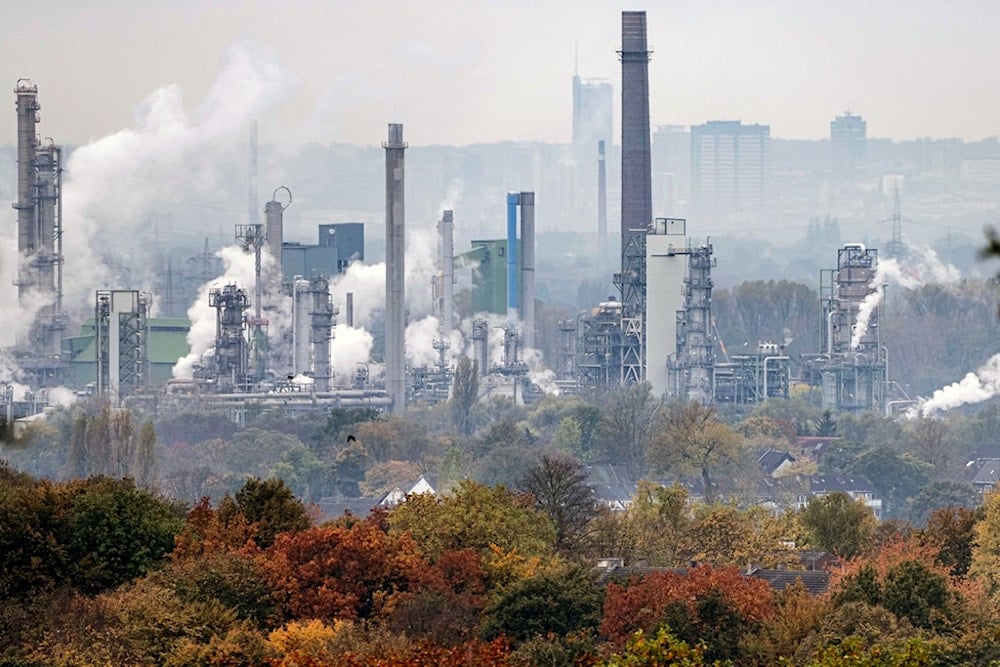Germany slips back into recession as US tariffs bite
Germany has slipped deeper into recession as US tariffs batter exports, exposing five years of stagnation driven by energy shocks, industrial decline, and political divisions over how to revive Europe's largest economy.
-

A BP refinery steams in Gelsenkirchen, Germany, while Europe's biggest economy is still shrinking for a second consecutive year and German industrial workers fear for their jobs, Thursday, Oct. 24, 2024 (AP Photo/Martin Meissner)
Germany's economy contracted more sharply than anticipated in the second quarter, with new data showing that higher US tariffs have dealt a heavy blow to exports and deepened concerns over the country's prolonged stagnation.
Figures released Friday by the federal statistics agency Destatis revealed that gross domestic product declined by 0.3 percent compared with the previous quarter, worse than the agency's initial estimate of a 0.1 percent drop issued in July.
The downturn was driven by a 0.6 percent fall in goods exports and a 1.9 percent drop in spending on machinery and equipment, underscoring the difficulties facing manufacturers in the first full quarter under Washington's new tariff regime. The United States is Germany's most important trade partner, accounting for roughly 10 percent of exports, particularly in key sectors like automobiles and chemicals.
Household consumption proved weaker than earlier estimates, while both the construction and industrial sectors posted disappointing results. Separate figures published earlier in August showed that German industrial production in June sank to its lowest level since the onset of the Covid-19 pandemic in 2020.
Trade Frictions and Structural Stagnation
The latest figures reflect not just the shock from tariffs but also years of underlying weakness in Europe's largest economy. German GDP shrank by 0.9 percent in 2023 and 0.5 percent in 2024, marking back-to-back contractions deeper than previously reported. Over the past five years, the economy has effectively stagnated, with output around 5 percent lower than it would have been if pre-pandemic trends had continued, equivalent to a loss of roughly €2,500 per household.
The malaise stems from long-term challenges: soaring energy costs since the loss of Russian gas supplies, fierce competition from China in manufacturing, and the government's restrictive fiscal "debt brake" rule that limits large-scale stimulus. Industrial output has declined steadily, falling about 12 percent since 2018, while construction has faced repeated downturns.
Earlier optimism had been fueled by government plans to pour hundreds of billions of euros into infrastructure renewal and rearmament, alongside a string of more positive indicators since the start of 2025. In July, business morale rose for the seventh consecutive month, reaching its highest point in years, and prominent think tanks such as DIW revised their growth projections upward.
But ING's chief economist Carsten Brzeski warned that this confidence was misplaced, driven mainly by "temporary front-loading as US customers rushed to get orders in before new tariffs took effect."
"Optimism alone doesn't bring back growth," Brzeski told AFP. "A full reversal of previous US front-loading effects has pushed the German economy back into recessionary territory."
Although the United States and the European Union reached an agreement in late July to stave off an all-out trade war, exporters remain uncertain about how the deal will be implemented. The arrangement leaves most EU products facing a 15-percent tariff, while German cars remain subject to a 27.5 percent duty until the EU passes legislation to scrap its own levies on American industrial goods.
"It is hard to see how the export-dependent German economy will be able to get out of seemingly never-ending stagnation," Brzeski added.
Political Strains
On the domestic front, debates over fiscal policy risk adding to the country's difficulties. Finance Minister Lars Klingbeil of the Social Democrats has floated potential tax increases to close a projected €30 billion gap in the 2027 budget. The idea met with swift opposition from Chancellor Friedrich Merz's Christian Democrats, who argue that lowering business taxes is essential to restore competitiveness.
"The tax burden for companies in Germany is already high," said Economy Minister Katherina Reiche of the CDU. "We need to talk about reducing the tax burden, not increasing it."
Brzeski warned that prolonged wrangling over austerity or tax changes could dampen confidence further: "The longer a debate on potential austerity measures lasts, the higher the risk that households and companies will hold back spending and investment decisions."
With exports under strain, industrial production depressed, and fiscal debates unresolved, Germany faces its most serious economic challenge in decades. Structural weaknesses, from energy dependence to lack of domestic demand, have left the country "too comfortable in stagnation," as Brzeski put it, raising doubts over whether recovery will arrive before 2026.

 4 Min Read
4 Min Read









